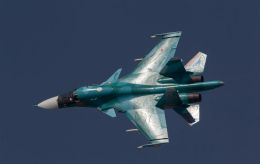Syrian rebel leader criticizes Israeli strikes on Syria
 Photo: Syrian rebel leader Ahmad al-Sharaa (screenshot from video)
Photo: Syrian rebel leader Ahmad al-Sharaa (screenshot from video)
The leader of the Syrian rebel group Hayat Tahrir al-Sham, which overthrew the regime of leader Bashar al-Assad, criticized Israel’s strikes on targets within Syria. He believes such actions by the Israel Defense Forces (IDF) risk serious escalation in the region, reports The Times of Israel.
Ahmad al-Sharaa, also known as Abu Mohammed al-Julani, stated in an interview with a Syrian news channel on Saturday, December 14, that Israel "no more excuses" for conducting airstrikes on Syria. He said recent attacks by the Israeli military on Syrian soil crossed red lines and posed a threat of unwarranted escalation in the region.
The rebel leader urged the international community to take responsibility to prevent further escalation and to ensure respect for Syria's sovereignty. Without explicitly naming Israel, he emphasized that diplomatic solutions are the only way to achieve security and stability, presenting them as a better option than reckless military ventures.
The new leader of Syria also indirectly addressed Israel’s concerns, offering reassurances. Sharaa noted that the country, exhausted by years of civil war, would not engage in conflicts that could lead to further devastation. He stated that Syria's top priorities are reconstruction and stability.
The commander added that Iran’s entrenchment in Syria had posed a significant threat to the country itself, its neighbors, and the Persian Gulf region.
“We were able to end the Iranian presence in Syria, but we are not enemies of the Iranian people,” Sharaa said.
Rule of law and stability
During the extensive interview, the Hayat Tahrir al-Sham leader touched on the challenges his new government would soon face in managing post-war Syria. He stressed the importance of abandoning the "revolutionary mentality" that had guided the rebels and the need to establish modern institutions, ensure the rule of law, and respect the rights of all citizens.
Sharaa delivered a scathing critique of Assad’s corrupt regime, accusing it of treating Syria as a "farm," extracting and appropriating its resources for personal gain. He added that documents exposing the scale of the regime's "enormous theft" would be published soon.
The rebel leader highlighted that their swift victory over the regime, toppled in just 11 days, demonstrated the effectiveness of their planning and preparation. He said the rebels "took control of large cities without anyone being displaced." At the same time, he acknowledged that internal conflicts, factionalism, and foreign interference had marked relations between various rebel factions.
Sharaa also referred to Russia’s limited air campaign against the rebels just days before Assad’s regime fell. He expressed concerns about the potential for a repeat of the Gaza Strip scenario. Regarding future relations with Moscow, he said regime change presents an opportunity to reassess ties in ways that serve shared interests.
Israel’s concerns
During a Saturday visit to Israeli troops stationed in the Golan Heights, IDF Chief of Staff Lt. Gen. Herzi Halevi stated that the Israeli military does not interfere in Syria’s internal affairs.
“There was an enemy country here. Its army collapsed. There is a threat that terror elements will come here, and we advanced so… extreme terror elements won’t settle close to the border with us,” said the IDF Chief of Staff.
Israeli Prime Minister Benjamin Netanyahu previously stated that the IDF had bombed military and strategic facilities abandoned by the Syrian army of Assad’s fallen regime to prevent them from falling into the hands of jihadists.
He added that Israel is open to establishing relations with Syria’s new leaders but would not hesitate to act if they posed a threat to the Jewish state or allowed Iran to regain its foothold in Syria.
Historical conflicts between Syria and Israel
The previous regime in Syria came to power in 1970 when Bashar al-Assad’s father, Hafez al-Assad, seized control through a bloodless coup. Bashar became president after his father’s death in 2000.
Israel and Syria have no diplomatic relations and have been in a formal state of war since Israel declared independence in 1948.
Syria was among the Arab nations that attacked the newly established Jewish state. Although a 1949 armistice agreement demarcated the border between the two countries, Syria never officially recognized Israel's existence.
Syria also launched attacks during the Six-Day War in 1967, but Israeli forces defeated the Syrian military and captured the Golan Heights, which Israel later unilaterally annexed.
In the 1973 Yom Kippur War, Syria once again attacked Israeli forces. However, the Syrian military was pushed back after an initial advance into the Golan Heights. Following the war, a disengagement agreement was signed in 1974, establishing demilitarized zones along the Israeli-Syrian border.
Although the fall of Assad’s regime, which lasted more than five decades, could present a historic opportunity for recognition between Israel and its neighbor, the potential power vacuum in Syria risks further chaos and could become a breeding ground for renewed terrorism in the region.
Fall of Assad’s regime in Syria
In early December, fighters from the Islamist group Hayat Tahrir al-Sham defeated Bashar al-Assad’s forces in just over a week, capturing key Syrian cities, including the capital Damascus. A transitional government of ministers has been established in the country for a three-month period.
However, immediately after the rebels seized Damascus, the IDF entered Syrian territory and took control of military and strategic facilities. Israel justified the move as an effort to prevent those assets from being used by terrorists or other groups against the Jewish state.
The IDF also struck at arms depots in the country. And later, it completely eliminated Syria's military fleet.

